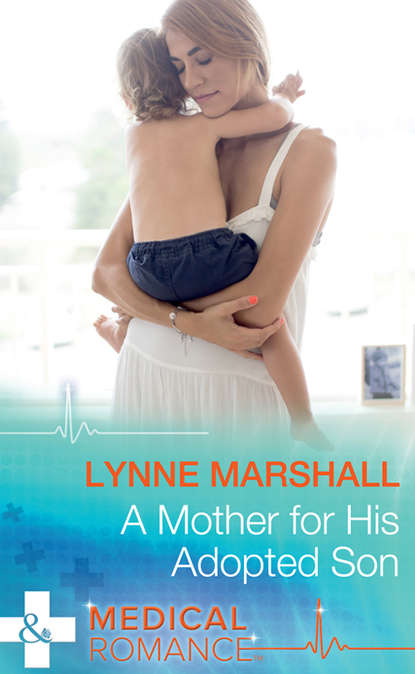По всем вопросам обращайтесь на: info@litportal.ru
(©) 2003-2025.
✖
A Mother For His Adopted Son
Автор
Год написания книги
2018
Настройки чтения
Размер шрифта
Высота строк
Поля
SAM MARCUS STOOD in the observation room above the OR suite in St. Francis of the Valley Hospital, waiting for his child to lose an eye. He’d seen his share of surgeries before, being a pediatrician, but never for someone he loved. This time he needed an anchor, so he leaned against the window to see his son better and to offer support against the threat of his buckling knees.
He watched as the anesthesiologist put his tiny boy under and while the surgeon measured the eye globe and cornea dimensions, the length of the optic nerve. His heart thumped in his chest, and a fine line of sweat gathered above his lip as the surgeon made the first incision. He swiped it away with a trembling hand, trying his best to get his mind wrapped around what was happening.
Enucleation.
His barely three-year-old newly adopted son had retinoblastoma and needed to have his left eye surgically removed. He swallowed hard and shook his head, still unable to believe it.
He’d fallen in love with Danilo, an orphan, on his last Doctors’ Medical Missions trip to the Philippines. The mission had been in response to their latest typhoon, to tend to the countless new orphans. He hadn’t been in the market for a son or daughter. No, it had been the last thing on his mind then. Yet there had been one particular one-year-old boy who’d lost his entire family in the typhoon and who’d miraculously managed to survive for forty-eight hours on his own. A little hero.
Over the days of the two-week mission, Sam and the other doctors had performed physicals and minor procedures, as well as arranged for other children who had required more extensive medical care to be transported to where they needed to be. Dani had used his new walking skills to follow Sam everywhere. It’d made Sam remember one of his favorite childhood books, Are You My Mommy? A story his own mother had read to him, where a little bird who’d fallen out of the nest went looking for his mother, asking everyone, even machines, if they were his mother, and it had broken his heart.
All the children on this mission were orphans dealing with their losses in their own ways, yet this child, Dani, seemed to have chosen Sam. He gave in and took the boy with him everywhere at the orphanage clinic, cautiously opened his heart, then fell in love in an amazingly short period of time. Then it was time to leave. Dani cried inconsolably, and one of the sisters at the orphanage told Sam that it was the first time the child had cried since arriving there six weeks before.
What was a man supposed to do? He knew how it felt to be homeless. He’d been taken away from his mother when he was ten. She hadn’t abused him, but she’d had to leave him alone most nights so she could work a second job. Her plan had backfired and the authorities had taken Sam and put him into foster care. Yeah, he knew how it felt to be left all alone.
Fortunately for him he’d been placed into a big happy family and currently suffered from missing them, with everyone fanned out all across the United States. There’d been five natural siblings in all, and he’d become kid number six, yet his already overworked foster mother had insisted on bringing in more foster children—a long, long list of foster kids had come and gone over the years. Why? he used to ask whenever he’d been instructed to share his bunk bed with yet another new kid. We don’t have room for more, Mom. She’d always insisted he call her Mom.
Even after all these years her response never left his subconscious. “We don’t always know how we’ll make ends meet or where they’ll sleep, Sammy, but we just know we’ve got to bring them in because the child needs a home.”
The child needs a home.
He’d been one of those children. And he’d been trying to prove himself worth keeping ever since.
When he’d returned home from the Philippines, he’d been unable to get Dani out of his mind. Missing his infectious smile and unconditional love, he’d decided to try for the adoption in honor of his deceased foster mother, because that child needed a home.
Though it had taken a year and a half to jump through all the hoops to arrange for Dani’s adoption, six months ago he and Dani had teamed up and never looked back. And what an adjustment being a single father had been. It’d always been hectic, growing up with so many foster siblings, yet under the chaos there had been stability. Something he’d never had when he’d been a young boy. That was his goal for Dani, to give the boy stability, but he’d never been a parent before and they were both on a stiff learning curve, working things out, juggling the logistics of his busy career, child care and father-son time.
Then this cancer nightmare had happened, and any stability they’d established had been replaced with utter mental and emotional turmoil.
They’d discovered the tumor on Dani’s very first eye examination in the United States. The simple yet disturbing fact that his pupil had turned white instead of red when the ophthalmologist had shone a light into it had heralded the beginning of more and more bad news. The child had intraocular retinoblastoma.
The team of doctors, headed by the pediatric oncologist, had recommended the surgery after all other avenues of treatment—each with drawbacks and no guarantees—had been considered and rejected. Dr. Van Diesel, the pediatric eye surgeon, had come highly recommended, and since there wasn’t a chance that Dani’s vision could be saved, they’d opted for enucleation.
Sam watched from behind the viewing window as the surgeon, through a dissecting microscope, removed the outer covering of the eye. Next the four rectus muscles were detached from the eyeball, then the surgeon placed a hemostat on the stump of the last severed eye muscle. With special long, minimally curved scissors, he cut the optic nerve. Sam’s battered heart sank, realizing the monumental change that single surgical incision had made to his son’s vision. He stood motionless, unable to take in a breath, emotion flooding through his veins as next the surgeon removed the eyeball.
Unable to swallow the thickening lump in his throat, Sam watched as a nurse stood nearby with a small specimen container to collect a tiny piece of the optic nerve for histopathologic study. For their next huge hold-your-breath diagnosis—had all of the cancer been removed or had it spread? His stomach pinched at the potential outcome. The doctor worked painstakingly to also open the eye globe to harvest tissue from the retinoblastoma. Before closing, he placed a plastic temporary conformer into Dani’s eye socket to avoid a shrunken look and maintain a natural shape. They’d discussed in advance how this would be done in preparation to ensure the proper size and motility for the future eye prosthesis.
When he finally could, Sam took a deep breath. The worst was over, no, check that, the worst had been getting the damn diagnosis of cancer in the first place. Since he wanted to keep a positive outlook, he’d deemed today the first step in Dani’s healing. He watched like a hawk as the anesthesiologist prepared his son for transfer to the recovery room and the surgical nurse bandaged Dani’s left eye with a special patch to help decrease swelling.
He rushed out of the observation deck and hustled down the stairs to be the first to talk with Dr. Van Diesel when he exited the OR.
“All went well,” the white-haired man said, as he tossed his gloves in the trash and removed the surgical cap then the mask from his face. “No surprises.” He forced a smile that looked more like a squint. “Should be a couple of days before we get the pathology reports.”
“Thank you.” And Sam probably wouldn’t sleep until he knew whether the tumor had spread or not. But he was determined to keep that positive attitude. As of right now the tumor was gone, his son was free of cancer. That was how it had to be.
The doctor continued on to the locker room. Sam stood outside the OR doors and waited for the team to transport Dani. Several minutes later the doors swung open and his son, looking so tiny on the huge gurney, got rolled toward the recovery room.
He followed the medical parade out of the surgical suite, down the hall and into Recovery. As he was a staff member as well as a parent, he was also allowed to accompany the boy rather than be instructed to wait outside until he was ready for discharge. The receiving RR nurses bustled around the gurney, transferring him to their bed, disconnecting Dani from the OR equipment and attaching him to theirs. Heart monitor, blood-pressure cuff, pulse oximeter, oxygen.
Sam remained by his son’s side, taking his tiny yet pudgy fingers into his own, feeling their chill and asking for a second blanket to cover him. Every once in a while his son moved or took a deeper breath. His heartbeat was steady and strong, blipping across the monitor screen; his blood pressure read low for a three-year-old, but he was still sedated. One particular Filipino nurse looked after Dani as if he were her own. That gave Sam reassurance.
“Is your wife coming, Doctor?” Her Filipino accent made the sentence staccato.
“No.” Sam shook his head. “No wife.”
He’d lost the woman with whom he’d thought he’d spend the rest of his life. She’d walked away. But he’d committed to adopting little Dani and he couldn’t bear the thought of disappointing the boy who would finally have a home and a family of his own. Even if it was just the two of them.
“I will watch him,” the nurse said. “Don’t worry. You should take a break.”
He stretched and glanced at her name tag. “Thank you, Imelda. I could use a cup of coffee about now.”
She nodded toward the nurses’ lunchroom. “We just made some.”
He thought about taking her up on the offer but realized how much he needed to stretch his legs, to get his blood moving again. To help him think. To plan. Maybe with more circulation to his brain he’d be able to process everything that’d happened today. “Thanks, but I’m going to take a walk.”
He stood and started to leave, then blurted the first thought in his mind. “By any chance, do you know where the prosthetic eye department is?”
Imelda pulled in her double chin. “Do we have one, Doctor?”
He tipped his head. Good question. Hadn’t Dr. Van Diesel mentioned it at one point? “I hope so.”
As he left the recovery room, he made eye contact with the charge nurse. “I’ll be back in twenty minutes but beep me the instant Dani wakes up, okay?”
She nodded, so he pushed the metal plate on the wall and the recovery room department doors automatically swung inward. With one more glance over his shoulder to his sleeping son, and another pang in his heart, he stepped outside.
The one-hour operation under general anesthesia was fairly routine, and because the eye was surrounded by bone, it made it much easier for Dani to tolerate. If all went well, his son could even be discharged later that afternoon.
He walked down the hall, entered the elevator. His mind drifted to Katie, wondering if this pain would have been easier to take sharing it with someone else, but that was never to be. Katie had stuck with him all through medical school and his pediatric residency at UCLA while she’d tried to launch her acting career. Sure, they’d talked about marriage and children, but mostly he’d avoided it. He’d been left by the most important woman in his life, his mother, at a tender age, and it had marked him for life. Toward the end of their relationship, she’d kept insisting on wedding plans and he’d kept sidestepping them. When he’d finally brought up marriage because of the adoption, after screaming at him for making such a huge decision by himself Katie had suddenly decided her acting career needed her full attention.
He’d screwed up by not consulting her, but he’d thought he’d known her, and she’d very nearly wrenched his heart right out of his chest when she’d walked away.
Not a great track record with the women he’d loved. At least his foster mother, Mom Murphy, had never sent him back.
The elevator stopped at the first-floor lobby and he headed to the information desk. “Don’t we have a department that makes facial prosthetics here? You know, things like eyes?”
The silver-haired gentleman’s gaze lit with knowledge. “Yes, as a matter of fact, I believe we do.” He scrolled through his computer directory, then used his index finger to point. “It’s called Ocularistry and Anaplastology.” The man had trouble pronouncing it and made a second attempt. “And it’s in the basement, with Pathology.” He placed his hand beside his mouth as if to whisper. “I think it’s next door to the morgue.”
“What’s the name of the head of the department?” Sam asked.
“Judith Rimmer. Or, as we volunteers like to call her, Helen Mirren without the star power. Hubba-hubba, if you know what I mean.”
Sam’s brows rose at the thought—so even old guys had crushes—but off to the dungeon he went. Once he exited the elevator, he wondered why the fluorescent lights even looked dimmer down in the hospital basement, but pressed on. He passed the Matériel Management department, then Central Service—the cleaning and sterilization area. He knew where Pathology was—he’d visited there regularly to get early reports on his patients and to discuss prognoses with the pathologists. He’d also unfortunately been to the morgue far more often than he cared to in the line of duty. Nothing cut deeper than losing a child patient, and for the sake of science he’d sat in on his share of autopsies to help make sense of the tragedies.
Sam sidestepped the morgue double doors, refusing to even glance through the ocean-liner-style windows for activity, then squinted and saw the small department sign for Ocularistry and Anaplastology in bold black letters. How many people would even know what it meant?
The office was shoved into the farthest corner in the hallway, as if it had been an afterthought. The panel of fluorescent lights just outside the door blinked and buzzed, in need of a new tube, making things seem eerier than they already were. He wasn’t sure whether to knock or just go inside. He glanced at his watch, he’d wasted enough time finding the department, so without a moment’s further hesitation he pushed through the door of the “prosthetic eye people’s” department.
A dainty, young platinum-blonde woman with short hair more in style with a 1920s flapper than current fashion arranged flesh-colored silicone ears under a glass display case, as if they were necklaces and earrings in an upscale jewelry store. She looked nothing like Helen Mirren but might pass as her granddaughter. What had that volunteer been talking about? On the next table sat a huge model of an eyeball. He narrowed his gaze at the odd juxtaposition.











